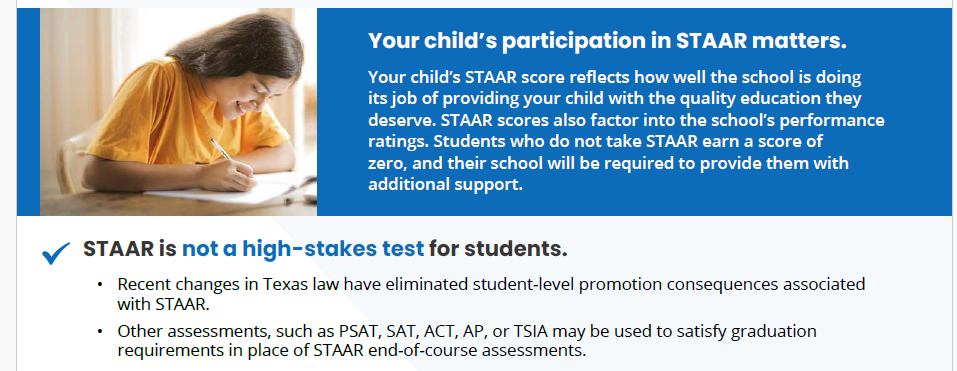When Kids are Pawns
As principal of Nazareth School, I believe that your children are our focus and not the
STAAR tests. Our students and teachers achieve amazing results, but this is not because we
focus on tests or legislative requirements. We focus on your children and teaching them what
they need to be successful.– Letter from Nazareth School Principal Robert O’Connor (removed from district website Summer 2024)
The soothing reassurances offered by Principal O’Connor to Nazareth ISD parents mirror the messaging that many school districts offer to parents as STAAR assessments draw nearer. They assure the parents that STAAR is not the end all and be all of assessments, that their kids are “More than a Score”, and that the best interest of each unique student is always the driving force behind the district’s mission. But the strength of those convictions is laid bare when parents decide to push back against the federal and state demands for constant assessment, by refusing to let their kids be cogs in the data machine that not only rates their local campuses primarily based on STAAR scores, but then aggregates that data to punish teachers, students and even strip entire districts of local control and the tax paying residents of their voting rights. Because when the conviction of the parent leads to a refusal to be assessed, the commitment of the district to the best interest of the students often disappears as quickly and easily as Principal O’Connor’s letter disappeared from the district website.
The overemphasis on STAAR, and the negative impacts that obsession over test data has on the classroom, has long been a point of contention across the country. Particularly in Texas, where assessment requirements have always exceeded federal requirements, and which has stack punitive consequences on students and districts alike, the parental pushback has been steady and insistent. When the legislature lost its collective mind in 2009 and put a regime of 12 EOC graduation tests in place, that also impacted GPA, moms organized and pushed back and quickly got the requirements cut to 5 EOCs (still in excess of federal requirements). Later developments included shortening the length of assessments, detaching retention requirements from 3rd grade assessment, and limiting the amount of benchmarking or pull out tutoring related to test prep.
By 2021, in fact, a new outlook on STAAR began to settle in both at the TEA and the legislature. The TEA began to clarify for districts that they were not obligated to fight parents who wanted to decline STAAR. They just had to offer the opportunity to be assessed; they did not have to lock kids in a room with the assessment for five hours and try to force them to take it. A simple e-mail from a parent was enough. At the legislature, the regime of automatic retention at the 5th and 8th grade level was repealed. Under the previous law, students had three chances to pass STAAR, and if they didn’t they were retained subject to review by a Grade Placement Committee. On appeal the committee could decide to promote the child to the next grade level. (As a side note, in ten years we did not receive a single report of an Opt Out student being retained). Nonetheless, the legislature, recognizing the forced retention has negative academic consequences, and was not moving the needle on test scores, removed the threat from students.
Indeed, the TEA, sent clear messaging to Texas parents that the state’s purpose for STAAR had changed. Parents were sent a flyer touting that STAAR was no longer a high stakes setting for kids. Specifically, parents were told that “Recent changes in Texas law have eliminated student-level promotion consequences associated with STAAR.”

Against this backdrop, Nazareth mother Samantha Nelson set about to assert her family’s protest of the STAAR Accountability regime.
This site uses Akismet to reduce spam. Learn how your comment data is processed.


Leave a Reply